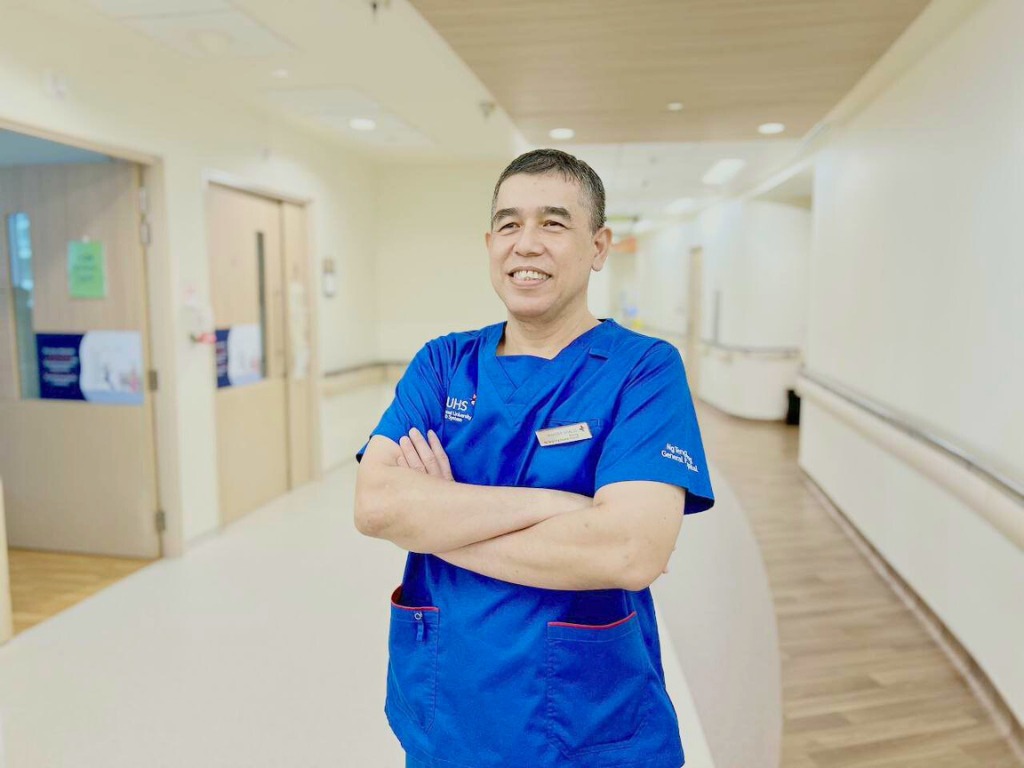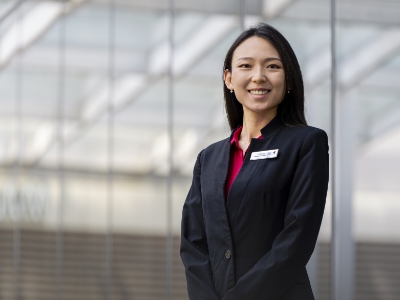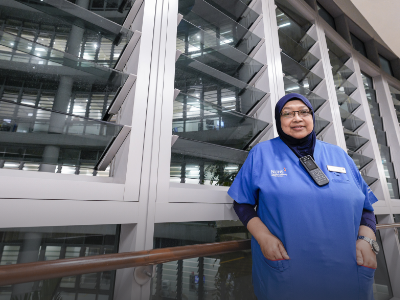The future of nursing at NUHS
PUBLISHED ON
SCROLL DOWN
Across NUHS, nurses are increasingly leveraging new tools to enhance patient care.
These tools include smart tech that supports real-time care during home visits, as well as virtual nursing systems powered by artificial intelligence (AI).
Nurses also work with researchers and healthcare partners to bring clinical tools into early screening and outreach programmes for communities.
This is the future of nursing at NUHS – where purpose, progress and passion move forward as one.
Six nurses share how job redesign and new care models improved patient outcomes, enhanced their critical thinking skills, and deepened their purpose in nursing.
Innovative tools, safer care
The integration of bi-directional smart pumps – infusion devices that receive medication orders and transmit data to the patients' electronic medical records – at the National University Hospital (NUH) enables real time medication administration and documentation.
First trialled at Ng Teng Fong General Hospital (NTFGH), the pumps ensure accurate medication delivery and dosage based on the patient’s weight, giving nurses peace of mind and saving time, enabling them to deliver more personalised care.
"In the ICU, every second matters. With the bi-directional smart pumps, it helps us to administer medication faster and safer, giving us more time to care for our patients."
– Mr Muhammad Ruzaini Bin Roslan, Assistant Nurse Clinician, NUH
Early detection, life-changing support
By bridging clinical research with real-world community care, NUHS nurses are making a direct impact beyond hospital walls and within the community.
In partnership with National University of Singapore (NUS), community nurses like Ms See Toh Ee Ling, Senior Staff Nurse from Regional Health System Office (RHSO), advance studies on mild cognitive impairment to improve early detection with the aid of technology.
With the data and insights collected, they are then able to tailor care plans for elderly patients in the community.
The RHSO uses the Quick Dementia Rating Scale to screen residents in the community – shifting detection beyond clinical settings and into everyday environments.
Apart from conducting these screenings, Ms See Toh also works with researchers from the NUS to improve early detection methods. She then shares these insights with community partners, enabling them to carry out screenings on their own. In doing so, Ms See Toh plays a vital role in connecting clinical research with community-based care.
"Through research, I am able to impact the lives of our community and transfer the knowledge to our community partners to provide better care for our residents."
– Ms See Toh Ee Ling, Senior Staff Nurse, NUHS RHSO
Hospital-level care, at home
At NUHS@Home, nurses bring hospital-level care into patients’ homes by integrating clinical expertise with smart tech for real-time remote support from other healthcare professionals in the team.
Working as part of a multi-disciplinary team, NUHS@Home nurses like Senior Staff Nurse Ms Lee Yen Ling play a proactive role in managing complex conditions and bring critical thinking, swift decision-making and clinical skills into patients’ home.
Patients receive round-the-clock support, with continuous vital signs monitoring, intravenous treatments, and tests such as blood and urine analyses. Nurses also make home visits when needed and are given the autonomy to make clinical decisions on site – a responsibility that Ms Yen Ling values.
Video calls, chatbots, and remote monitoring further help to ease manpower constraints and support the programme’s long-term sustainability.
"Nursing acute patients at home empowers me to advocate for my patients"
– Ms Lee Yen Ling, Senior Staff Nurse, NUHS@Home
Faster response, better outcomes
At NTFGH, a collaboration with the Alice Lee Centre for Nursing Studies (NUS Nursing) has led to the development of a multimodal sepsis training programme for nurses.
Senior Staff Nurse Ms Aye Wint Khin is among the nurses from the Emergency Department who have benefitted from the programme, which aims to enhance nurses’ clinical reasoning, standardise sepsis care, and support timely decision-making.
The programme includes a sepsis pocket guide, 360-degree simulation videos, an interactive training game, and a nurse-led screening and management protocol – all designed to improve early sepsis detection and intervention, which increases the survival rate for patients with sepsis.
Explaining the genesis of the programme, Dr Chua Wei Ling, Assistant Professor from NUS Nursing, who played a key role in its development, said, “Evidence showed that multifaceted interventions, including protocol-based care and sepsis education, are more effective in improving both care processes and patient outcomes compared to education alone.”
"I feel more confident in assessing sepsis patients because of my enhanced clinical insight and deeper understanding. The programme has truly made a difference in how I deliver better patient outcomes."
– Ms Aye Wint Khin, Senior Staff Nurse, NTFGH
Smarter tech, greater efficiency
In the smart wards at Alexandra Hospital (AH), nurses are trialling the virtual nurse concept — an AI-driven initiative designed to streamline workflows and reduce repetitive tasks.
Working closely with multi-disciplinary teams, they assess its clinical relevance, safety, and feasibility before broader implementation.
The initiative is expected to enhance efficiency and give our nurses greater professional and personal fulfilment, even with higher patient volumes anticipated in the years ahead.
“Technology isn’t here to replace us but to help us serve better,” said Staff Nurse Ms Ng Li Xin from AH.
With virtual nursing, we’re not just adapting to change – we’re shaping it and rethinking what nursing can be, while giving nurses the time and space to grow in other areas.
– Ms Ng Li Xin, Staff Nurse, AH
Shared decisions, empowered teams
A new multi-disciplinary team model at National University Polyclinics (NUP) is bringing nurses, family physicians and care coordinators together in a teamlet to deliver personalised care.
Nurses are actively involved in care planning and decision-making and work closely alongside other healthcare professionals in their team to co-create better treatment options. This approach enables nurses to elevate their practice and thrive in an environment that supports professional growth and personal wellbeing.
"Ultimately, nurses are better equipped to think critically and have more opportunities to lead and contribute in more meaningful ways."
– Ms Manjula Ramadas, Care Manager, Jurong Polyclinic, NUP
As these nurses across the NUHS cluster show, they are not just adapting to change – they are helping to shape it. Whether in hospitals, clinics or homes, they are reimagining how care is delivered, using teamwork and technology to bring care closer to patients. What drives them is a clear sense of purpose – and a commitment to grow alongside their patients.
Join NUHS nursing today! Click here for more information.
In consultation with Dr Chua Wei Ling, Assistant Professor, NUS Nursing; Mr Muhammad Ruzaini Bin Roslan, Assistant Nurse Clinician, NUH; Ms See Toh Ee Ling, Senior Staff Nurse, NUHS RHSO; Ms Lee Yen Ling, Senior Staff Nurse, NUHS@Home; Ms Aye Wint Khin, Senior Staff Nurse, NTFGH; Ms Ng Li Xin, Staff Nurse, AH; and Ms Manjula Ramadas, Care Manager, NUP.



